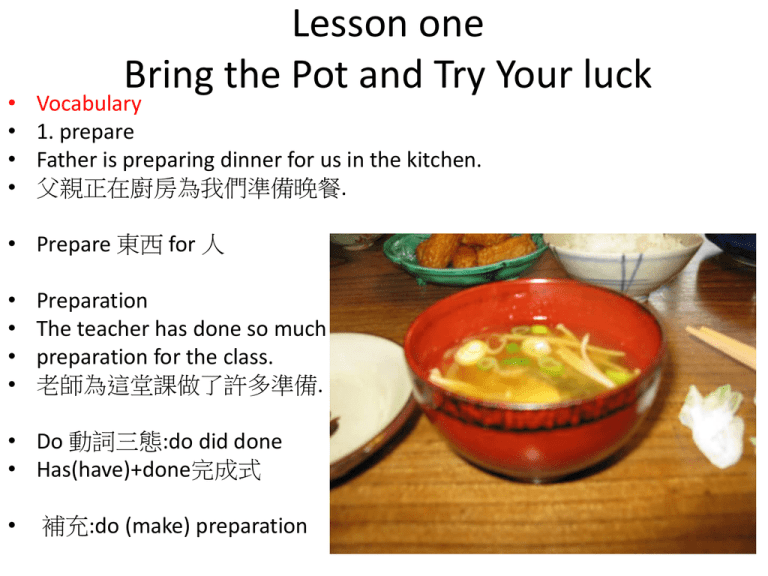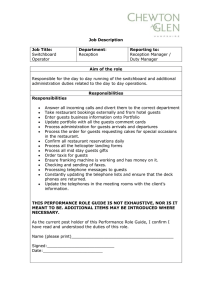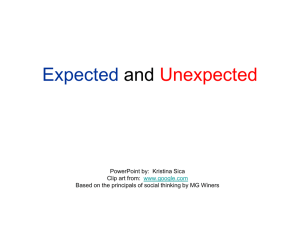Lesson one Bring the Pot and Try Your luck
advertisement

• • • • Lesson one Bring the Pot and Try Your luck Vocabulary 1. prepare Father is preparing dinner for us in the kitchen. 父親正在廚房為我們準備晚餐. • Prepare 東西 for 人 • • • • Preparation The teacher has done so much preparation for the class. 老師為這堂課做了許多準備. • Do 動詞三態:do did done • Has(have)+done完成式 • 補充:do (make) preparation 練習: Henry ___ a lot of food ___ the hungry children in the asylum(避難所). We should work together(一起) to ____ the coming typhoon. Jane is making dough(麵團) in ___ ___ making doughnuts(甜甜圈). • 2. guest • We must get the dinner ready before the guests arrive. • 客人到之前,我們必須把晚餐準備好. • get 東西 ready • 把東西準備好 • 練習: • The waiter is showing the ___ to their seats(座位). • show you around (帶你參觀.) • 例:I will show you around the kitchen later. • 我等一下會帶你參觀廚房. • 3. host 主人 • The host of the party welcomed his guests with a smile. • 宴會主人臉帶笑容地歡迎它的客人. • The host of the party宴會的主人 • 例:The role of the teacher • 老師的角色 • 例:The love of a mother • 母親的愛 • with 有,具有,帶有 • 練習: • My grandfather is the ___ at the family gathering(聚會). • 4. surprise 驚奇,驚喜 • Close your eyes. I have a surprise for you! • 把你眼睛閉上.我要給你一個驚喜. • Polly surprised her mother by making her a birthday card. • Polly 為母親做了一張生日卡,令她很驚奇. • By making+ 人+東西 • 介係詞+Ving • • • • By 表示方式: 例: The house is heated(加熱) by gas. 例: I will contact(聯絡) you by letters(信). To Sb.’s surprise 使某人吃驚 例: To Hermione’s ___, Ron showed up(出現 ) at the party. 例: Ron ___ Hermione by suddenly(突然地) appearing(出現) out of (來自) nowhere. 例: We are surprised ___ Kate’s marriage(結婚) to William. • 5. joyful 喜悅的 • Christmas is a joyful time of the year. People get together and have fun. • 聖誕節是一年中的歡樂時光.人聚在一起並且玩得開心. • A joyful time of the year • 一年中的歡樂時光 • Get together 聚在一起 • Have fun 玩得開心 • We had a very ___ reunion(團聚) of all the family last weekend. • Reunion of all the family • 全家人團聚 6. awkward 尷尬的 I felt awkward after I told everyone a bad joke. No one laughed. 跟大家講了一個不好笑的笑話後,我感到尷尬.沒有人笑. Feel 動詞三態: feel felt felt Tell動詞三態: tell told told Tell +人 +事 Tell +事+to+人 I told a bad joke to everyone. It is ___ to ask a lady about her age. • 7. assign 分配,指派 • The teacher assigned some new homework to the students. • 老師分配了一些新的作業給學生. • Assign+ 東西+to+ 人 • Assign+人+東西 • My boss ___ me the task(工作) of giving an oral presentation(口頭報告) • Assignment (指派的) 工作,任務 • I still have two reading assignments to finish by this Friday. • 這星期五之前,我還有兩個讀書作業要完成. • By 在…之前 • Can you finish the work by five o’clock(五點前)? • I will have it done(做完) by tomorrow(明天前). • Our ___ is to visit museums(參觀博物館). • 8. rest 其餘的人,剩餘的部分 • One of the guests has to leave soon, but the rest are staying for the weekend. • 客人中的一位很快就必須離開,但其他客人這週末還會 待著. • One of the guests 客人中的一位 • Has to 必須 • For 表示一段(安排好的時間) • For 表示一段時間or (安排好的)時間 • I am going away(離開)for a few days. • We are invited(被邀請) for 7:30. • I’ll have some of the pizza, and the rest is for you. • 我將吃一些披薩,其餘的給你. • Some of the pizza 披薩其中的一些 • For 表示 給予 • There is a letter(信) for you. • 例:My mother always finishes(吃完) what the ___ of us do not eat for dinner(當晚餐). • 例:You look tired(看起來很累). Maybe(也許) you need(需要) some ___. • 9. originally 起初,原來 • Originally, we planned to go to Japan, but then we won the trip to Thailand. • 起初,我們計畫要去日本,但後來我們贏得了泰國之旅. • Win動詞三態:win won won • The original price of the car was too high. It is much cheaper now. • 這輛車原先的價格太高.現在便宜多了. • The original price of the car • 這輛車的原來價格 • • • • Much+比較格 Much cheaper 便宜多了 much better 好多了 Much the worst 糟透了 • Darwin wrote many books about the origins of life on earth. • 達爾文寫了許多有關地球生命起源的書. • Write動詞三態write wrote written • The origins of life • 生命的起源 • 例: ___, I planned to go mountain climbing(爬山), but it suddenly(突然地) rained. • 例:Jane Austen’s house has been preserved(保留) with(具有) many of its ____ features(特色). • 例:The ___ of the use of paper is unclear(不清楚). People have different theories(理論). • The use of paper紙的使用 • 10. unexpected 出乎預料的 • Lady Gaga is always full of surprises. She does unexpected things and wears strange clothes. • Lady Gaga總是充滿驚奇.她做令人難以預料的事,且穿奇怪 衣服. • full of 充滿 • Do unexpected things 做無法預料的事 • Jenny fainted(昏倒) when she learned of(知道) her brother’s death(死) in an ___ accident(車禍) • Jenny 在得知她哥哥死於意外車禍後,他昏了過去. • Olivia ___ Cesario to visit(拜訪) her tomorrow. She can’t wait(等不及) to see him again • 11. fair 市集,博覽會,公平的 • There will be a book fair in the public library this weekend. • 下週末在公立圖書館獎有書展. It’s not fair for me to do all the cleaning. You should help, too! • There will be 將有… • For 就…而言 • For me 對我來說 • Spring clean 大掃除 • 例:Sarah wants to know if you will visit the Scarborough ___ again. • It is not ___ to make(叫) jack do all the work. • 12. secret 秘密的, 秘密 • The host left the house through a secret door. • 主人經由一道密門離開房子. • Leave動詞三態:leave left left • Through 藉著 • You can only achieve(獲得)success(成功) through hard work(努力工作). • There should be no secrets between true friends. • 真正的朋友之間應無秘密. • There should be 應該有/ There will be 將有 • Between 在…之間 • I sat down(坐下)between Jo and Diana. • 例:Details(細節) of James Bond’s project(計畫) remain (仍然是)___. • 例:Please tell me the ___ of making good jam(果醬). • 13. recipe 食譜 • These cakes and cookies are yummy. Can I have your recipe for them? • 這些蛋糕及餅乾很好吃. • 你能給我它們的食譜嗎? • • • • For 供,給 This is the place for me. I got a new table for the dining room(餐室). 例:Annie’s family ___ has been handed down(傳下來) for many generations(代). • 片語 • 1. invite sb over 邀請某人來 • Lily plans to invite some friends over for her birthday party. • Lily 打算邀一些好友到家裡參加她的生日派對 • • • • (日本燒酒酒瓶身有一首詩: 白樂天:一盃復倆盃/多不過三四/ 便得心中適/盡忘身外事/更復強一盃/ 陶然遺萬累. ) • For 因為,由於 • She gave me a watch for my birthday. • 例:Dean ___ his classmates ___ to celebrate(慶祝) Christmas. • 2. Come up with 想出,找到 • George came up with a great plan to save money. • George想出一個省錢的方法. • Come 的動詞三態: come came come • Young people often ___ ___ ___many fresh(新鮮的) ideas. • 3. in fact 事實上 • I thought the test would be difficult, but in fact, it was easy. • 我以為測驗會很難,但事實上,它很簡單. • Think 的動詞三態:think thought thought • 例:Sharon may seem(似乎) to dislike(不喜歡) Peter, but ___ ___, she loves Peter secretly. • 4. throw out 丟棄,拋棄 • Andy never throws out his old toys. • Andy 從不丟棄他的舊玩具. • 例:Don’t ___ ___ the bottles(水瓶). They can be recycled(被回收). • 5. show up 出現 • The superstar showed up at the party unexpectedly and later left secretly. • 這超級巨星出乎預料地出現在宴會中,之後有秘密地離開了. • Unexpectedly(副詞) 出乎預料地 • Unexpected (形容詞)出乎預料的 • An unexpected visitor • 例:A lot of fans(粉絲) crowded(聚集) around the airport(機場), and waited for their idol(偶像) to ___ ___ Reading • “What do you want for dinner?” Cathy asked her friend on the phone. • 凱西在電話中問她朋友,”晚餐你想吃甚麼?” • On the phone 用電話 • 例:The information is available(可獲得的) on the Internet. • The program(節目) is on Channel(頻道) 19. • What is on TV? • She was inviting friends over for a New Year’s Party. • 她正在邀請朋友到家參加新年派對. • for 表示一段(預定的)時間 • I have an appointment(約會) for October 10. She was excited about the gathering and wanted to plan a big dinner. • 她對這聚會感到興奮, 並打算準備一頓豐盛的晚宴. • Excite動詞三態: excite excited excited • 動詞過去分詞是形容詞表示完成或被動 • 完成式: have(has)+過去分詞 • 被動式: be(am, is, are, was, were)+過去分詞 • Excited(感到)興奮的,激動的 • An excited crowd(群眾) of people gathered(聚集) around her. • Exciting令人興奮的,激動的(現在分詞也是形容詞) • This is an exciting story • However, it was tiring for her to prepare everything by herself. • 然而,一個人要打點一切可會累壞她. • tiring 令人疲累的 • Tired感到疲累的 • By herself 靠她自己 • She finally came up with a good idea• a potluck party! • 最後,她想到了一個好點子—百樂餐. • finally 最後 • Final 決賽,期末考 • At the finals, they lost(輸) to Germany. • He failed(不及格) his finals. • At a potluck party, each guest brings a dish to share, so the host doesn’t have to do all the work. • 在百樂餐會中,每位客人帶一道菜與大家共享,所以主人不 需要做所有工作. • Have to 必須 • Each 每一個 • Every 每一個 • Each answer(答案) is worth(價值) 20 points(分). • He knows every student in the school. • The guest can cook his or her dish, or bring storebought food. • 客人可以自己煮菜,或帶商店買的食物來. • • • • • • • • Store-bought 商店裡買的 Sun-dried 曬乾的 Sun-drenched 充滿陽光的 awe-inspiring 令人驚嘆的 Meat-eating 吃肉的 Absent-minded 心不在焉 Light-hearted 輕鬆的 Heavy-hearted 悲傷 • There will be many kinds of dishes, and each dish can be a surprise. • 將有很多種類的菜,而每一道菜都可能是個驚奇. • There will be 將有 • (Many) kinds of +東西 • 很多種類的… • What kind of house do you live in?你住哪種房? • They sell all kinds of things.他們賣各種東西. • However, some surprises are not so joyful. • 然而,有些驚奇不是令人那麼愉快的. • When two or more guests bring the same dishes, they may feel awkward. • 當有兩位或更多客人帶來相同的菜時,他們可能感到 尷尬. • The same 相同的 • • • • • • • Feel awkward 感到尷尬 Feel happy Feel sad Feel sorry Feel better Feel guilty(犯罪的) Feel faint (頭暈的 • So, it is important for the host to do some planning before the party. • 所以,對主人來說,派對前,做一些安排是重要的. • For 對…來說 • 句型: It is +形容詞+for 人 +to V • For example, the host can ask some guests to prepare salad and pasta, and assign others to bring pizza and fried chicken. • 例如,主人可要求一些客人準備沙拉和義大利麵, 分配給其他人帶披薩 及炸雞. • Assign 人 to V… 分配某人做… • Assign others to bring • 分配其他人帶… • Fried chicken 炸雞 (分詞是形容詞) • Pan-fried chicken用平鍋煎的雞 • The rest can make tiramisu and puddings. • 其他的人可以做提拉米蘇吉布丁. • In fact, a potluck was not originally a party. • 事實上,百樂餐原先並不是一種餐會. • The word comes from the Middle ages. • 這個字起源於中世紀. • At that time, people did not throw out leftovers. • 在那時,人不會丟棄剩菜. • In 表示一段期間 • In spring/summer/autumn • In the morning/afternoon • At 表示在某一時刻 • At that time 在那時 • Throw out 丟掉 • Throw off 匆匆脫掉 • They kept them warm in a pot for unexpected guests. • 他們把剩菜放在鍋裡保溫,以招待不速之客. • Keep動詞三態: keep kept kept • Keep 保持 • • • • • • Keep warm保溫 Keep off 勿踏草地 Keep left 靠左走 Keep balance 保持平衡 Keep you waiting 讓你久等 Keep going 繼續走 • An expected guest 期待的客人 • An unexpected guest 不速之客 • So when guests showed up at someone’s house, they tried the “luck of the pot,” and had anything in it. • 所以,當客人出現在某人家裡時,他們就品嘗鍋裡的運氣,吃鍋裡 的東西. • Show up 出現 • At 表示在某處 • At someone’s house在某人家 • Try 試,試用,試吃,試驗 • Luck of the pot 鍋裡的運氣 • Have(has)動詞三態: have(has) had had • Have(has) 吃 • Had anything in it • 吃鍋裡的任何東西 • A potluck is like a small food fair. • 百樂餐會就像一個小的食物博覽會 • Like 像 • When guests prepare their dishes, they hope their food is the most popular. • 當客人準備他們的菜時,他們希望他們的食物是最受歡迎 的. • Hope+(that) 子句 • I hope (that) you are OK. • Hope +for 希望,期待 • We are hoping for good weather(天氣) on Sunday. • They may prepare their grandma’s secret recipe. • 他們可能準備他們祖母的私房菜. • Or, the dish may even come from a top-rated restaurant! • 或者,這些菜甚至可能來自頂級的餐廳. • Even甚至 (強調用語) • A five-star restaurant • 五星級餐廳 • A top-rated restaurant • 頂級餐廳 • Eating is an interesting experience at a potluck party. • 在百樂餐會中,吃是一種有趣的經驗. • Eating 是由動詞eat變化而來,它當主詞用,是動名 詞, 動名詞是名詞. • Interesting 也是由動詞interest變化而來,但它是 當形容詞用,稱為現在分詞. • Interesting people 有趣的人 • Interesting places有趣的地方 • Interesting work有趣的工作 • Next time you plan a party, why not try a potluck? • 下次你要計畫一個派對時,何不試試百樂餐會呢? • Next time+S+V…下次… • Why not +原形動詞 • 例:Next time you wear the dress, try to match it with white shoes. • 下次你穿這衣服時,試試用白色鞋來配它. 文法 • 文法一 • S+Vi • 若動詞本身語意完整,不需有受詞(O) 來接受該動作,這類 動詞稱為“不及物動詞(Vi),如rain,cry,sleep等 • It is raining. • The baby cries. • He sleeps. • S+Vt+O • 反之,若動詞須加受詞,才能表達完整意思,這類動詞稱為” 及物動詞(Vt), 如 invite, buy, find等. • I invite him. • She buys food. • Mary finds it. • S+Vi 後面可加修飾詞,如副詞,介係詞片語,以擴充 句子內容. • S+Vt+O 受詞可為名詞,代名詞,不定詞,動名詞,名詞 子句,名詞片語等. • 例: • The word “potluck” comes from the middle ages(中 世紀).(介係詞片語做修飾詞) • Cathy wanted to plan a big dinner. (不定詞做受詞) • At a potluck party, each guest brings a dish to share(分享).(名詞作受詞) • The guests hope (that) their food is the most popular(受歡迎的).(名詞子句作受詞) • 文法二 • It is/was+Adj (+for人)+to V • 1. 此句型用來描述某個行為的狀態或情形. • 2. 句子真正的主詞是to V,但為了避免主詞過長, 多用 虛主詞it 代替,而將真正的主詞移至句尾. • It is/was +Adj+to V • 表示”做某件事是…的” • It is/was +Adj +for人+to V • 強調”對某人而言,做某件事是…的” • 例: • It is dangerous(危險) to swim(游泳) here. • it was tiring(令人疲累的) for Cathy to prepare everything by herself(獨自). • It is important(重要的) for the host to do some planning(計畫) before the party. • It is convenient(方便的) for students to go to school by MRT(捷運). 聽力練習 • L1 Listening 聽力測 驗.mp3









